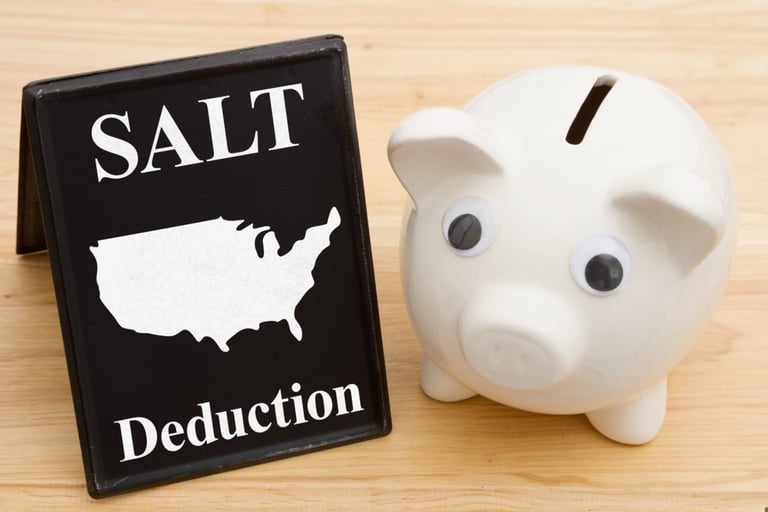The $40K SALT Deduction Cap: What It Means for New Jersey Homeowners
Starting with the 2025 tax year, the federal deduction cap for state and local taxes (commonly called the SALT deduction) will jump from $10,000 to $40,000 for most filers.
The $40K SALT Deduction Cap: What It Means for New Jersey Homeowners
If you’re looking to buy, sell, rent or invest in a home here in New Jersey, there’s a tax change you need to know about — and yes, it does affect your bottom line. I’ll walk you through the new rules, how they impact homeowners (and soon-to-be homeowners), and what that means in practical terms. As a reminder: I’m your realtor, not a tax attorney or accountant — always check with your tax pro for personal advice.
What’s different
Starting with the 2025 tax year, the federal deduction cap for state and local taxes (commonly called the SALT deduction) will jump from $10,000 to $40,000 for most filers.
Here are the key details:
The cap is lifted to $40,000 for those with modified adjusted gross income (MAGI) of $500,000 or less (for 2025).
If your income is above that threshold, your deduction begins to “phase down” by 30% of the excess above $500,000 — but the deduction will never go below the original $10,000 cap.
The $40,000 cap will increase each year by about 1% through 2029 (so in 2026 it’s $40,400, 2027: $40,804, etc.). After 2029, unless Congress acts again, the cap reverts to $10,000 from 2030 onward.
Important: The standard deduction still applies. Only people who itemize can use SALT. Also, this deduction applies to state/local income, property, or sales taxes (not all of them in full in every case).
Why this matters in New Jersey & for homeowners
Since property taxes in New Jersey tend to be high and many homeowners already pay significant state/local income or property taxes, this change offers some meaningful upside:
If you’re paying, say, $20,000+ combined in property and state taxes, you may now have access to a bigger federal deduction — which could improve the net cost of owning a home.
For sellers: Having more favorable tax outcomes may make the value of ownership and moving more attractive. If I’m helping someone consider relocating — “should we stay, or should we move to a home with possibly higher taxes, but still great quality?” — this might help the “move” side of the equation.
For investors: If you own rental property (or are considering investment real estate), higher property taxes may become more deductible for a while, improving cash-flow potential after taxes.
For buyers: Knowing this change is in place gives you more ammunition when doing the math: “How much will this cost me after figuring out if there is a tax advantage? What’s the real net cost of this house?”
Important caveats & “don’t rely on this alone” warnings
This relief is temporary: The higher $40K cap only applies 2025-2029. Then it goes back to $10,000 unless Congress acts. If you’re making a long-term move, don’t plan on unlimited SALT benefit forever.
Income matters: If you (or you + your spouse) earn well above $500,000, you may not get the full benefit. For example, earning $550,000 means the cap starts being reduced by 30% of the $50,000 excess.
Itemizing required: If you take the standard deduction instead of itemizing, you won’t benefit from SALT. For many homeowners, especially those with smaller tax burdens or simpler finances, the standard deduction may still be better.
This is tax deduction relief, not a tax credit. It reduces taxable income, not the tax bill dollar-for-dollar. The actual benefit depends on your tax bracket and other deductions.
Because I’m not your tax advisor, you should always loop your accountant or tax professional into your real-estate decision if SALT is a key factor.
How I help as a REALTOR®
If you’re considering a move to reduce property taxes (and maybe state/local taxes), I have experience in identifying towns with relatively lower tax burdens yet strong housing markets. We can talk through tax implications, net cost of ownership, property-tax savings strategies and long-term investment potential.
Bottom line
This increase in the SALT deduction cap is good news for many homeowners and investors — but it’s not a silver-bullet. Use it, yes, but plan for the phase-out and make sure it fits into your broader home-ownership or investment strategy.
If you’re ready to explore homes, sell your current one, or check out investment property in Northern NJ (or want me to locate a trusted agent in another state), let’s connect.





